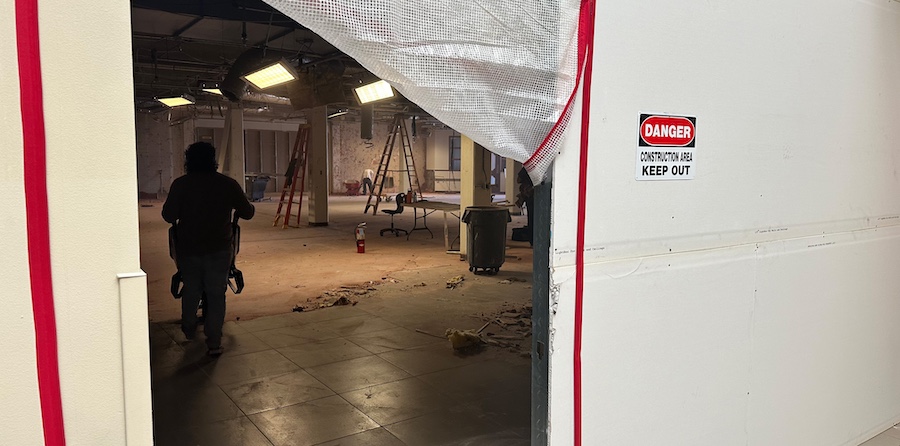
Article
October 23, 2024
Written by Sydney Kern
Addressing Food Insecurity on Campus with Expanded Resources
'Students say this has been a resource that changed their life': grant helps fund expanded Bear Pantry and new Center for Student Well-being
In 2023, the United States Department of Agriculture’s (USDA) Economic Research Service reported that 13.5% of U.S. households were food insecure at some point during the year. The USDA defines this as households that were uncertain of having, or unable to acquire, enough food to meet the needs of all their members due to insufficient money or other resources for food.
In 2023, the United States Department of Agriculture’s (USDA) Economic Research Service reported that 13.5% of U.S. households were food insecure at some point during the year.
The USDA defines this as households that were uncertain of having, or unable to acquire, enough food to meet the needs of all their members due to insufficient money or other resources for food.
For college-age students, the rate of food insecurity is much higher. According to spring 2023 reports from the American College Health Association National College Health Assessment, 50% of undergraduate and 39% of graduate students reported experiencing food insecurity in the past 30 days. At the University of Northern Colorado (UNC), the spring 2023 survey revealed even higher rates with more than 50% of both undergraduate and graduate students reporting some degree of food insecurity in the past 30 days.
And if recent traffic to the university’s food pantry is any indication, those numbers could be on the rise. To meet that demand, and address other basic needs of students, the university is taking action.
“Seeing the need is relatively overwhelming. I see a lot of obstacles that students face. It’s just a tough time right now.”
— Freddie Horn
Bear Pantry, the university’s free food pantry for students, faculty and staff, has occupied several spaces on campus since 2014. Come January, it will be colocated with the newly created Center for Student Well-being in the lower level of the University Center. Made possible in part by the recent philanthropic generosity of The Weld Trust, the newly remodeled location will triple the size of the pantry and offer expanded services through the center, such as personalized support to connect students with other resources related to food insecurity, housing insecurity, medical and mental health care and emergency funding.
The university was recognized as a Hunger Free Campus last August by the Colorado Department of Higher Education. Rather than signifying that UNC has eradicated food insecurity on campus, the designation recognizes that UNC has a comprehensive program in place to expand food support for students and employees.
“We have been working on this new concept for the past 11 months of creating a dedicated space that will support financially challenged students,” said Taylor Schiestel, the director of Student Outreach and Support. “The new Bear Pantry and the Center for Student Well-being will be a one-stop shop for basic needs resources, instead of having them housed in different areas around campus.”
Schiestel is in charge of the Bear Pantry, along with the pantry’s graduate assistant Freddie Horn. Horn is a second-year graduate student studying Clinical Mental Health Counseling and spends most of his time outside of the classroom in the pantry’s current small office on the second floor of the University Center, surrounded by peanut butter, pasta, soup, and other food items.
“When I first got into UNC, I started to look at graduate assistantships and found the Bear Pantry,” Horn said. “I knew I wanted to do something where I would be contributing, I didn’t want to have a position just to have the position.”
Horn picked the right course of action. His passion for helping and giving back is evident as he manages, restocks, purchases products and handles community collaboration for the pantry. He’s also the main familiar face of the operation. During the 25-minute interview discussing his job, Horn interrupted the conversation mid-sentence to mingle with pantry customers.
“Hi, how are you? Good, thanks,” Horn said.
“Thank you for coming, have a great day.”
This is Horn’s main goal – to make sure the students utilizing the pantry feel comfortable, safe and welcome.
“There can be a stigma attached to needing a food pantry, so we try to eliminate that stigma,” Horn said. “How we do that is we build a warm and inclusive community for everyone to come by. So, we do our best to greet everyone and ensure they do not feel judged here.”
This aspect of the job has become just as important as ensuring there is enough food to give out because the number of people showing up has grown. The food pantry has been seeing record numbers of students waiting to be greeted and given the food items they need.
“Seeing the need is relatively overwhelming,” Horn said. “I see a lot of obstacles that students face. It’s just a tough time right now.”
Compared to this time last year, Horn says about 15 to 20 more people each week come through the Bear Pantry. While that number might not seem high, last year the Bear Pantry supplied food to more than 1,100 students, faculty and staff totaling more than 5,000 visits with returning and new customers.
“More than half of UNC’s students report experiencing some degree of food insecurity in the last 30 days,” said John Hancock, assistant vice resident for Wellness and Support. “So, it’s a really big issue.”
Hancock oversees many UNC programs designed to support student health and well-being. To find out the status of food insecurity at UNC, Hancock’s staff administered the National College Health Assessment III survey to a sample of UNC students in spring 2023. Survey results indicated that 57.6% of undergraduate students taking primarily in-person classes in Greeley reported some degree of food insecurity in the last 30 days. For graduate students studying primarily in Greeley, the percentage of students reporting some degree of food insecurity was 52.3%.
Horn has witnessed this need firsthand.
“I’ve had a lot of students come in and say this has been a resource that changed their life,” Horn said. “We have students who come in every single week who we enjoy keeping up and visiting with, and we also see new faces.”
Feeding the Demand
The Bear Pantry was first created in 2014. Back then, the storefront was no bigger than a closet. It has since grown through the years both in physical size and through community partnerships to create more food accessibility. And now, around 10 years later, the Bear Pantry is about to receive its biggest facelift yet.
A $310,000 grant from The Weld Trust, along with approximately $430,000 from UNC and gifts from other generous donors both large and small, provided the funding for the Bear Pantry to relocate, triple in size and become a one-stop-shop for student resources through the new Center for Student Well-being.
“When you are economically vulnerable, it’s not like the only thing you need is food. This is a way for us to bring a lot of those services together to serve students in a much more holistic way.”
— John Hancock
“We are so excited for this upcoming renovation,” said Schiestel. “We know it’s going to have a huge impact on our student body, especially for those who may not know about the resources.”

Artist rendering of the new Center for Student Well-being

Artist rendering of the new student lounge area.
The revamped pantry will exist on the lower level of the University Center, taking the place of the former Student Computer Commons. There will be a new student lounge just outside of the pantry, and across the lounge will be the Center for Student Well-being. There, students experiencing financial challenges will be able to take advantage of programs that target a variety of basic needs.
“There will be resource navigators who will help support with any sort of government assistance,” said Schiestel. “That could include enrolling in the Supplemental Nutritional Assistance Program (SNAP) or Medicaid. Resources navigators will also help students connect with other basic needs resources, including affordable mental health and medical care, utility resources, emergency housing, legal assistance, childcare referrals, transportation support and emergency financial assistance.”
“When you are economically vulnerable, it’s not like the only thing you need is food,” Hancock added. “You tend to have a lot of needs, and this is a way for us to bring a lot of those services together to serve students in a much more holistic way.

Crew workers renovating the new Bear Pantry and Center for Student Well-being.

Crew workers renovating the new Bear Pantry and Center for Student Well-being
Construction on the new Bear Pantry and the Center for Student Well-being began in October. On the outside, what now looks like plain white drywall will soon transform into a grocery-style shop where students, faculty and staff who don’t have enough to eat can browse the food available and shop for what they need.
“Right now, we’re able to provide individuals with as many as seven items they can take home each week,” Schiestel said.
Schiestel knows this resource will give students one less thing to worry about.
“Research shows that if a student has not eaten sufficient nutritious food or slept the night before an exam, they will have greater difficulty mastering the material and performing well. So, students who have their basic needs met are going to have more mental bandwidth and physical bandwidth to focus on their studies or whatever else is important to them, whether it’s taking care of children or working for pay,” Hancock said.
Becoming a Hunger Free Campus
The renovations complement the university’s designation as a Hunger Free Campus and signifies that UNC has a comprehensive program in place for supporting hungry students.
For example, the state recognized UNC for not only providing a food pantry, one of the designation requirements, but also for establishing a successful partnership with The Weld Food Bank’s Mobile Food Pantry. The Mobile Food Pantry truck typically visits UNC’s campus once each month in September, October, November, February, March, April, June and July. The Mobile Pantry provides community members with bags of fresh fruits, vegetables, meat and dairy items.
A third program that helped garner the Hunger Free Campus designation is the Bear Share Meal Program, which allows eligible students to request up to three meals that will be added to their university ID card and can be utilized in Holmes Dining Hall. This program is also coordinated by Bear Pantry staff.
“With everything we do, we want to be one step closer to meeting all the needs of our students,” said Schiestel.
The commitment to supporting hungry students is the reason why Schiestel and Horn will continue to devote their time to helping anyone who visits the Bear Pantry.
“I still tell our volunteers this could be five minutes of someone’s day where they get to be seen, heard, validated and acknowledged,” Horn said. “So, you’ll always hear a ‘hey, how are you?’ from me when stepping into the pantry.”
The renovations to Bear Pantry and The Center for Student Well-being are expected to be completed in January, with a grand opening in February.
“This next chapter of the Bear Pantry and the Center for Student Well-being is such a huge accomplishment thanks to all of our current and past staff, faculty and volunteers who have put so much effort into bettering the pantry,” Schiestel said. “Our efforts would not be where they are today without their hard work.”
Andrew Galster, UNC’s student podcaster for this season’s Bear in Mind podcast, sat down with Taylor Schiestel Director of Student Outreach and Support and Freddy Taylor Graduate Assistant to Bear Pantry to talk about this project more in depth and the new Center for Student Well-being coming up next Febrary.




